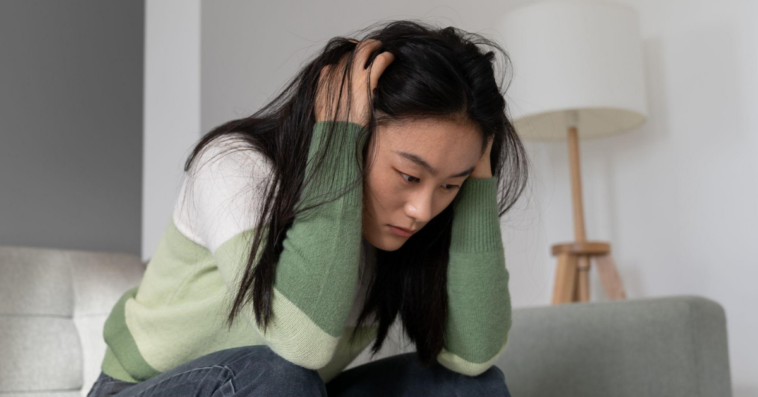It is no secret that stress and anxiety can be overwhelming and surprising in nature – but did you know that physical symptoms can be just as unpredictable? What can make things even more difficult is that one can sometimes feel the physical manifestations of anxiety without feeling anxious at all emotionally. From shortness of breath to indigestion, the physical tolls of anxiety can be just as significant as the mental toll on one’s overall well-being.
An estimated 31.1% of U.S. adults experience an anxiety disorder in their lives – yet at the same time, it is an often misdiagnosed disorder.
While the mental and emotional tolls of anxiety are important to know, its physical manifestations should not be ignored. If you feel like you may be experiencing an anxiety disorder, or are a student studying a mental health-related course such as an online Masters in Mental Health Counseling, you might find it helpful to learn about some of the most common, yet often overlooked, physical symptoms of anxiety.
Is it Anxiety?
The first and foremost question is to know whether your symptoms are caused by anxiety or not. The best way to determine this is to see your healthcare professional who will be able to help identify if there might be another cause of your symptoms. You should also see a mental health professional – a psychologist, therapist, or counselor will use screening tools, and inquire into one’s physical and emotional symptoms, to assess whether they are experiencing anxiety.
Different types of anxiety disorders vary in severity, and everyone experiences them differently. Anxiety disorders can include:
- Panic disorders.
- Generalized anxiety disorder (GAD).
- Separation anxiety.
- Social anxiety.
- Phobias.
- Obsessive-compulsive disorder (OCD).
Knowing all of these factors is necessary as it can impact diagnosis and treatment. Occasionally, anxiety can also coexist with other mental health conditions such as depression. Ensuring that a therapist knows first-hand about your symptoms and personal circumstances can allow for the most effective diagnosis and treatment.

The Effect of Anxiety on the Body
An almond-shaped region of our brains called the amygdala – responsible for emotional processing – plays a critical role in developing feelings of fear and anxiety. When we feel anxious or frightened, the amygdala calls on the brain to signal that feeling to the entire body. It then initiates the ‘fight-or-flight’ response, the physiological reaction we experience in the face of a fearful event.
Adrenaline, a hormone that assists us in preparing a response to such situations, and cortisol, another hormone referred to as the body’s main ‘stress hormone’, are released in this process. Ultimately, this chain reaction of anxiety can manifest itself in various ways across different individuals. Long-term anxiety can be particularly dangerous as physical symptoms can degenerate into chronic physical conditions. Here are some ways anxiety might manifest physically in our bodies — some of them may be surprising:
Muscle Aches
The main cause of muscle discomfort in anxiety is due to tension. It is a common symptom as under a stressful situation one can often find themselves clenching the jaw or stiffening up. Doing such for a long time inevitably leads to pain since it directly strains and hardens muscles – pain can either be sharp or dull. But how does anxiety cause this?
One study conducted on 853 participants in 2006 found that those who had higher anxiety levels had higher levels of cytokines, signaling molecules that regulate inflammation. Having an overproduction of these molecules causes inflammation in the joints and muscles which induces the sensation of muscle aches and pain.
Racing Heart and Chest Pain
Abnormal increases in heart rate are a classic sign of anxiety according to the National Institute of Mental Health (NIMH). Many patients describe this as a ‘racing’, ‘pounding’, or ‘fluttery’ feeling in the chest, and they can often get mistaken for a heart attack.
Under a stressful situation, the ‘fight-or-flight’ response places additional strain on the heart; disproportionate stress levels can inflame the system, potentially disturbing normal heart rhythms. While faster heart rates allow more blood to pump to the muscles to assist in combating a threat, the ‘racing’ heart, however, would only further intensify the sense of anxiety, causing a vicious cycle. Consequently, it can also lead to chest pain, which is an uncomfortable and scary, yet also common anxiety symptom.
Breathing or Respiratory Changes
Have you found yourself unconsciously holding your breath or breathing too fast during stressful situations? According to Dr. Olivia Faull at the University of Zurich (Switzerland), anxiety significantly alters the brain’s perception of breathing and respiratory signals. This was demonstrated in a study conducted by Dr. Faull on 30 people from each anxiety level group. The study found that those with higher levels of anxiety were less sensitive to breathing changes and had an impaired awareness of these signals.
The U.S. National Library of Medicine suggests that changes in breath can catalyze other symptoms of anxiety. This is because either not breathing enough or breathing too fast can disrupt the balance of oxygen and carbon dioxide throughout the body. In the case of increased breathing, while allowing the lungs to draw in more oxygen to assist stress response, it can simultaneously lead to hyperventilation, which can worsen stress. A shortness of breath can create a rather dramatic anxiety episode for patients.
Troubles in the Gut
Anxiety is known to wreak havoc on the gastrointestinal (GI) system. Nausea, diarrhea, constipation, indigestion, bloating, and other GI issues can all be part of an anxiety attack. Doctors have even termed this phenomenon the ‘nervous stomach’. Troubles in the gut from anxiety are due to the brain-gut connection, a communication system between the brain and the enteric nervous system (ENS) located in the gut responsible for governing digestion – it is also referred to as the ‘little brain’.
It is rather self-explanatory as to why the stomach goes into chaos under stress. Besides the connection, some studies have revealed that chronic stress can significantly alter the gut microbiome and change fats and immune defenses – obesity, Type 2 diabetes, and fatty liver disease are just some of the risks that can emerge from this. Issues such as gastrointestinal reflux, peptic ulcer disease, and irritable bowel syndrome are also potential physical consequences of more severe forms of anxiety.
Hair, Skin, and Nails
Thinning of hair follicles or hair loss, brittle or peeling nails, and the aggravation of skin conditions can all, in fact, be signs of an anxiety disorder.
Telogen effluvium is an example of a common hair loss condition caused by constant stress. A traumatic event can potentially ‘shock’ the body and push hair growth into what is known as the telogen phase, or in other words, a resting phase. This results in a thinning of hair on the scalp and a reduction of the amount of hair follicles that allow hair growth. Inevitably, this causes one to experience hair loss.
Nails can also be a tell-tale sign. Anxiety is able to temporarily disrupt or stop the production of some or all new nails. The presence of Beau’s lines, horizontal white dots across nails; habit-tic nail deformity, ridges that usually appear on the thumb; and nail-biting, are often caused by anxiety.
And finally, anxiety can significantly aggravate skin conditions such as eczema, rosacea, acne, and psoriasis. In the case of acne for example, when the body releases stress hormones like cortisol, it can increase the skin’s oil production, exacerbating the condition and causing more potential flare-ups.
Managing Physical Symptoms
Treatment options such as cognitive behavioral therapy (CBT) work to treat anxiety. One may find such therapeutic options to be effective, but it is also important to manage symptoms, especially physical symptoms, in targeted ways. Here are some ways you can do this:
- Massages – These are great for muscle aches and relieving tension.
- Breathing/relaxation techniques – Learning to control and relax your breaths through techniques such as deep breathing can allow you to control your future stress responses and avoid hyperventilation.
- Meditation – Practices such as Yoga and Tai Chi can be effective ways to relax and calm your mind and body.
- Prioritize sleep – While it may seem hard as sleep issues often accompany anxiety disorders, still try to get as much sleep as possible. Only through quality rest one can properly manage and cope with symptoms.
- Exercise regularly – More and more research shows that being outdoors and engaging in physical activity is crucial to promoting mental health and well-being.
As with any health concern, if you feel like your body may be telling you something, it is best to talk to a doctor or mental health professional. In the meantime, or while receiving treatment, the information and advice in this article should help you identify and cope with the physical symptoms of anxiety that you may be experiencing.








Comments